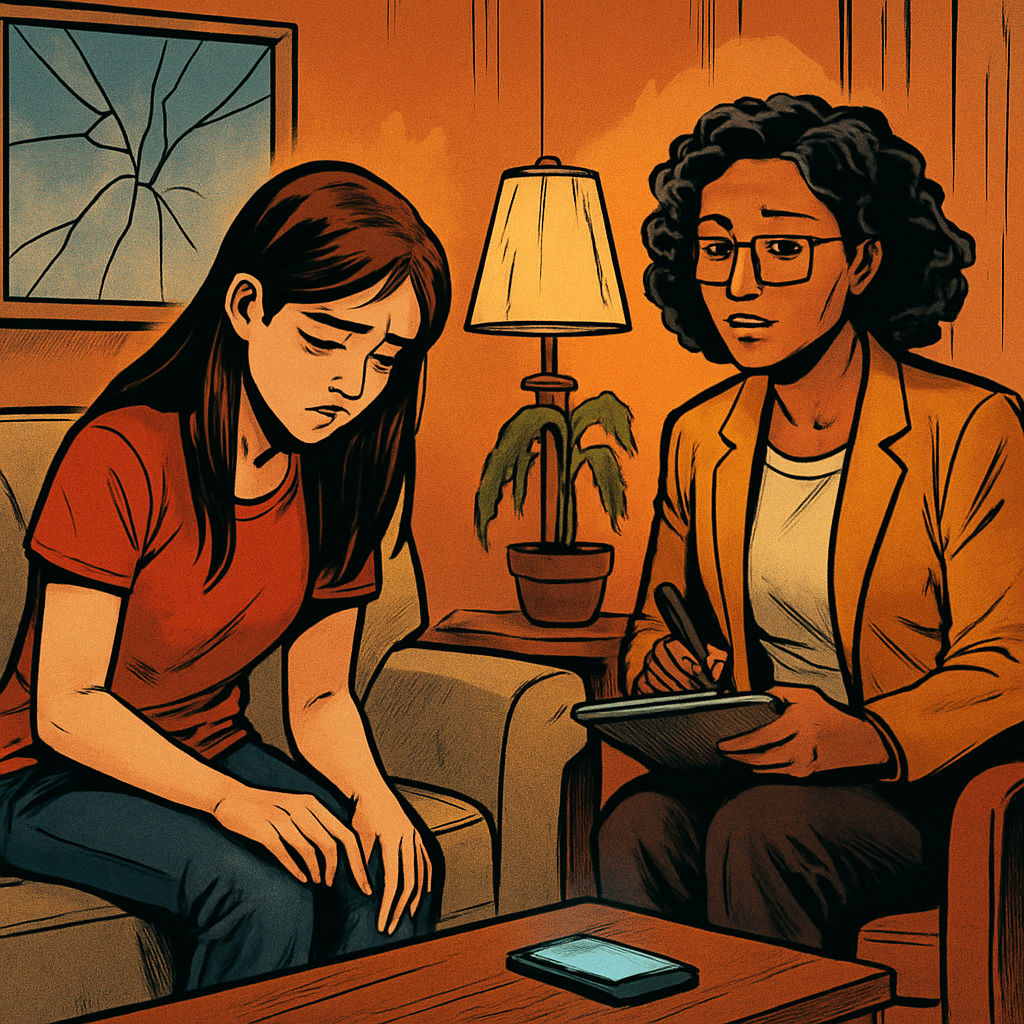💔 The Emotional Mathematics of Friendship Loss
Let me tell you about the emotional mathematics of friendship breakups: they hit with approximately 3.7 times the force of romantic ones, yet receive about 0.02% of the cultural sympathy. Everyone prepares you for heartbreak from lovers. Nobody warns you about the nuclear winter that follows when your friend group splinters like a dropped mirror.
Emily.K came to me after what she called her “friendship apocalypse.” I remember her sitting in my office that first day, eyes fixed on the carpet pattern as if it contained secret messages, fingers nervously tracing the seam of my couch cushion.
“Everyone acts like I should be over this by now,” she whispered. “It’s been eight months since the fallout with Jess, but I still wake up reaching for my phone to text her about something funny. Then I remember she’s gone, and so is everyone else who chose her side.”
🪞 The Self-Esteem Spiral That Nobody Talks About
Here’s what research consistently dances around but rarely states plainly: friendship breakups create identity crises. When Emily lost her social circle, she didn’t just lose people to text on Friday nights. She lost the mirrors that reflected back who she thought she was.
What fascinated me about Emily’s situation was how quickly her emotional bytes had reconfigured themselves. These fundamental units of emotional information—containing physical sensations, emotional charges, and mini-narratives—had completely rewired her self-perception. Where once her emotional frames interpreted social situations through a lens of belonging, they now defaulted to rejection and unworthiness.
“I feel like I’m failing at being a person,” she told me during our third session. “Everyone else seems to know how to maintain friendships. What’s wrong with me that I couldn’t keep mine?”
Nothing. Absolutely nothing. 🌟
🎭 The Invisible Script Everyone’s Following
What Emily couldn’t see—and what most of my clients in similar situations miss—is that we’re all operating from emotional scripts we didn’t write and often can’t even see. These automatic behavioral patterns feel inevitable, like gravity. They create self-fulfilling prophecies that reinforce our worst fears.
Emily’s script went something like this: “I’ve been abandoned, therefore I’m unworthy. I’m unworthy, therefore I should isolate myself. I’m isolated, which proves I’m unworthy.”
Spot the problem? 🤔
When I pointed out this circular logic, Emily laughed for the first time in our sessions. “So I’m basically running around my emotional hamster wheel getting nowhere?”
“Exactly,” I said. “And here’s the kicker—most people are running on their own wheels too, just as convinced that their loops are actually straight lines leading somewhere important.”
🔍 The Granularity Solution
Over the following months, we worked on what I consider the most underrated psychological skill: emotional granularity. Emily had been experiencing her pain as one massive, overwhelming emotional “bubble”—a generalized sense of badness that felt permanent and all-encompassing.
We broke that bubble down into manageable “fizz”—specific, distinct emotional states with beginnings, middles, and ends. Not just “I feel terrible,” but:
- “I feel disappointed that my attempts at reconciliation were rejected”
- “I feel embarrassed about crying at that party”
- “I feel angry that mutual friends didn’t check on me”
This granularity allowed Emily to work with her emotional bytes rather than drowning in them. Instead of trying to eliminate her painful emotions (which never works), she began integrating them into a more complex, nuanced understanding of herself and her relationships.
🦋 The Transformation
When Emily returned for our final session, she wasn’t “fixed” in the way many clients hope to be. Her friendship apocalypse hadn’t magically reversed. But her needs navigator—her internal system for identifying her own emotions and needs—had strengthened considerably.
“I still miss them,” she told me. “But I no longer think their absence defines me.”
✨ Core Insight
The people who matter most aren’t the ones who stay forever—they’re the ones who make you forever different after they leave.
Wondering how your own emotional bytes are running the show? Start by asking yourself which emotional scripts feel so natural you’ve never thought to question them.
Until next time,
Sophia Rivera (who once lost her entire friend group over a heated debate about whether a hot dog is a sandwich, and lived to tell the tale) 🌭
Research References:
https://www.apa.org/pubs/journals/releases/psp-pspp0000265.pdf
https://pubmed.ncbi.nlm.nih.gov/31556680/
https://journals.sagepub.com/doi/10.1177/08902070241292987?int.sj-full-text.similar-articles.7
https://uwaterloo.ca/news/media/q-and-experts-how-does-self-esteem-affect-relationships
https://www.ucdavis.edu/curiosity/news/research-review-shows-self-esteem-has-long-term-benefits
https://cbtpsychology.com/how-our-self-esteem-affects-our-relationships/
https://pmc.ncbi.nlm.nih.gov/articles/PMC4359724/
https://www.apa.org/news/press/releases/2019/09/relationships-self-esteem

